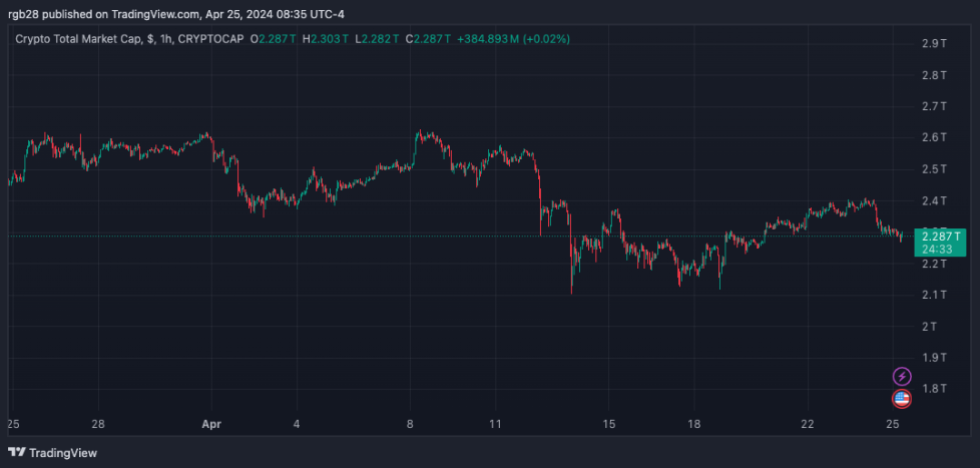Upbit dominates South Korea's crypto market with 80%, growing amid regulatory changes and global com
A recent report revealed that the South Korean exchange Upbit dominates the local crypto market with over 80%. Additionally, Upbit rose to fifth place in the top five global exchanges list.
Different platforms have unsuccessfully challenged the exchange’s dominance in the country, and the upcoming regulatory framework has affected them.
Upbit Enters The Top-Five Global Crypto Exchange List
News media outlet Bloomberg reported on Upbit’s latest feat after eclipsing the Korean market. The reining Korean exchange holds over 80% of the country’s trading volume.
Notably, Upbit’s dominance level hasn’t been accomplished by other exchanges on any prominent crypto hub. According to official numbers cited by Bloomberg, over 6 million Koreans, around 10% of the population, traded cryptocurrencies in the first half of 2023.
The increase in volume during this bull run has propelled the exchange to the fifth spot among the global exchanges. Upbit’s $2.84 billion daily trading volume runs neck-and-neck with Coinbase’s $2.86 billion.
According to the report, South Korean exchange transactions accounted for almost a fifth of its banking partners’ total deposits last year. Similarly, altcoins account for 80% of Korean exchanges’ trading volume, while global platforms register a much smaller volume, with 50%.
Despite the looming shadow of Do Kwon and Terra Labs’ $40 billion meltdown, the Korean market continues to grow and become a market with the “keenest crypto traders with a taste for high-risk, high-reward tokens” in the world.
Moreover, recent reports revealed that the South Korean Won surpassed the American dollar as the leading currency for crypto trades globally in Q1,2024. The surge suggests a massive appeal and increasing popularity for crypto among South Koreans.
As a result, campaigns for the upcoming elections tried to attract voters, with candidates promising to work on regulations and taxes.
Does The New Regulatory Framework Favor Upbit’s Dominance?
South Korean regulators will implement the Virtual Asset User Protections Act in July 2024. The new regulatory framework will implement stricter requirements and consequences on exchanges, including potential life sentencing for criminal acts.
Moreover, operators must “take steps to meet liabilities” after hacks or system failures. The requirements demand both significant “capital and manpower,” according to Nam Hyeon Joon, a spokesperson for Korea’s second-largest exchange, Bithumb.
The new regulatory landscape was “designed to protect investors” after the Terra Labs collapse, but it has affected smaller exchanges. Platforms like Huobi Korea, Cashierest, and Coinbit have shut down since the bill was passed last year.
Simon Seojoon Kim, CEO of the Venture Capital firm Hashed, believes that well-resourced crypto exchanges like Upbit will make it easier to meet the requirements. “For existing and new entrants, the cost of complying with these requirements could be substantial,” stated Kim.
Korbit Research analyst Min Seung Kim concurs with the sentiment, adding that the competition will be limited as trading remains “increasingly focused on the top exchange.”
Platforms trying to compete with Upbit’s dominance have gone into zero-fee campaigns. According to the report, Bithumb briefly challenged Upbit after reaching a market share peak of 39.2% in January. However, the share dropped by more than half after its promotion ended.
Ultimately, entering the South Korean crypto market continues to be difficult. As recently seen with Crypto.com, complying with the country’s regulatory requirements requires a defined strategy and vast resources.
Crypto Total Market Cap is at $2.28 trillion. Source: TOTAL on TradingView




![[LIVE] Engage2Earn: Sam Rae for Hawke boost](https://cdn.bulbapp.io/frontend/images/6b43c624-bd70-48c8-b0bc-7bc27c86e0ee/1)









![[ℕ𝕖𝕧𝕖𝕣] 𝕊𝕖𝕝𝕝 𝕐𝕠𝕦𝕣 𝔹𝕚𝕥𝕔𝕠𝕚𝕟 - And Now What.... Pray To The God Of Hopium?](https://cdn.bulbapp.io/frontend/images/79e7827b-c644-4853-b048-a9601a8a8da7/1)




























